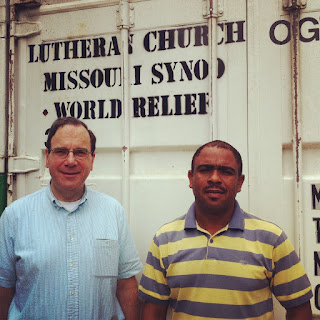LCMS President Rev. Dr. Matthew C. Harrison's February 16, 2012, testimony before Congress with representatives of the Roman Catholic, evangelical Christian, and Jewish on the threat to religious liberty posed by the contraception mandate recently promulgated by President Barack Obama's Health and Human Services department has generated significant press coverage.
You can listen to the audio file of the eight-minute interview by clicking either here or here.
Right-click here to save MP3
President Harrison testified in a hearing titled, "Lines Crossed: Separation of Church and State. Has the Obama Administration Trampled on Freedom of Religion and Freedom of Conscience?"
President Harrison testified: "I'm here because there is a narrow but very significant provision in the HHS provisions that is, I believe, very dangerous to religious people with our kind of convictions -- and it's also dangerous to any religious people with unique convictions."
CNN posted a story on their front page titled, "Culture War 2.0: The New Front Lines." CNN did not quote President Harrison.
Below is a brief catalog of press stories about President Harrison's testimony before congress on religious freedom:
Tim Townsend of the Saint Louis Post-Dispatch wrote a story titled, "Lutheran leader sides with Catholics on contraceptives issue in fiery testimony."
The New York Times covered the event with a story titled, "Passions Flare as House Debates Birth Control Rule." The NY Times writes quotes Harrison, "'I pray for the president every day,'” Mr. Harrison said, even as he expressed 'deep distress' over the new policy and complained of 'government intrusions into Christian conscience and practice.'"
CBS News displayed its bias with a story titled, "Dems decry all-male House panel on WH contraception rule." CBS News quoted President Harrison, "Religious people determine what violates their consciences -- not the federal government. Please get the federal government, Mr. Chairman, out of our consciences."
 |
| Saint Louis Post-Dispatch Story About President Harrison's Congressional Testimony |
Tim Townsend of the Saint Louis Post-Dispatch wrote a story titled, "Lutheran leader sides with Catholics on contraceptives issue in fiery testimony."
 |
| New York Times Coverage |
The New York Times covered the event with a story titled, "Passions Flare as House Debates Birth Control Rule." The NY Times writes quotes Harrison, "'I pray for the president every day,'” Mr. Harrison said, even as he expressed 'deep distress' over the new policy and complained of 'government intrusions into Christian conscience and practice.'"
 |
| Fox News Coverage |
Fox News posted a story titled, "Contraception ruling: Democrats accuse clergy of complicity with GOP at hearing." Fox News quoted President Harrison testifying, "While we are grandfathered under the very narrow provisions of the HHS policy, we are deeply concerned that our consciences may soon be martyred by a few strokes on the keyboard."
 |
| CBS News Coverage |
 |
| CNN Front Page Coverage |
Molly Hemingway wrote a clever-titled story, "A Lutheran, a Jew, a Baptist and a Catholic Walk Into A Hearing."
THOMAS MESSER, an LCMS pastor, wrote an op-ed piece, "Religious liberty on trial in America."
Maggie Karner, LCMS Director of Life and Health Ministries wrote a piece titled, "Where the Women Were During the House Contraception Mandate Hearing," for Christianity Today.
St. Louis Radio Host Interviews LCMS President Matthew C. Harrison on HHS Ruling
Maggie Karner, LCMS Director of Life and Health Ministries wrote a piece titled, "Where the Women Were During the House Contraception Mandate Hearing," for Christianity Today.
St. Louis Radio Host Interviews LCMS President Matthew C. Harrison on HHS Ruling
On Friday, Feb. 17, KMOX radio host Charlie Brennan interviewed LCMS President Rev. Dr. Matthew C. Harrison on his appearance before a House committee regarding the recent HHS mandate on health insurance and its mandatory coverage of contraceptives.
Right-click here to save MP3
President Harrison's testimony before Congress can be seen here:
The LCMS Webpage also is maintaing up-to-date coverage at http://www.lcms.org/hhsmandate.
The LCMS Webpage also is maintaing up-to-date coverage at http://www.lcms.org/hhsmandate.
-- Posted by Rev. Dr. Albert Collver, Director of Church Relations





















